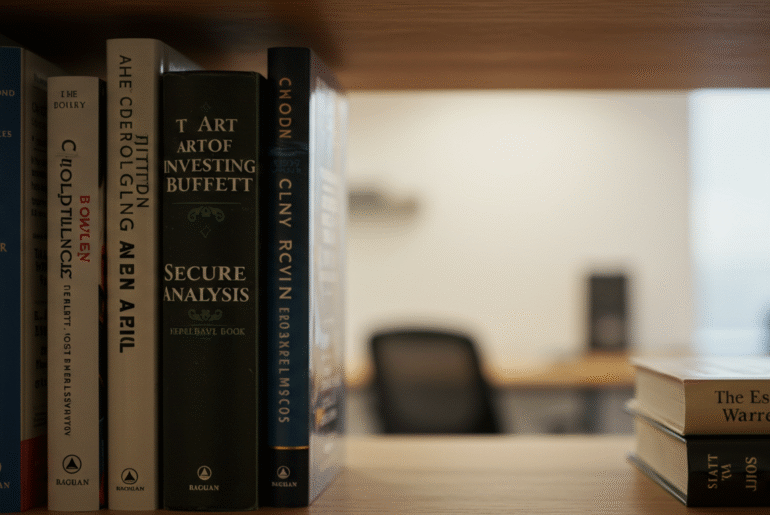This article may contain references to products or services from one or more of our advertisers or partners. We may receive compensation when you click on links to those products or services. Nonetheless, our opinions are our own.
The information presented in this article is accurate to the best of our knowledge at the time of publication. However, information is subject to change, and no guarantees are made about the continued accuracy or completeness of this content after its publication date.
Investing can feel intimidating at first, but the right guidance can make it simple and rewarding. These beginner-friendly books offer practical strategies, easy-to-follow advice, and insights to help you grow your money wisely. Whether you want to learn about stocks, bonds, or personal finance, these guides make investing accessible for anyone starting out.
- Top Investing Books for Beginners
- 1. The Intelligent Investor by Benjamin Graham
- 2. Rich Dad Poor Dad by Robert Kiyosaki
- 3. A Random Walk Down Wall Street by Burton G. Malkiel
- 4. The Little Book of Common Sense Investing by John C. Bogle
- 5. Your Money or Your Life by Vicki Robin and Joe Dominguez
- 6. Invested by Danielle Town and Phil Town
- 7. The Simple Path to Wealth by JL Collins
- 8. One Up On Wall Street by Peter Lynch
- 9. Broke Millennial by Erin Lowry
- 10. Common Stocks and Uncommon Profits by Philip Fisher
- 11. The Millionaire Next Door by Thomas J. Stanley & William D. Danko
- FAQs
- Closing Insights
- Recommended Reads
Top Investing Books for Beginners
1. The Intelligent Investor by Benjamin Graham
Often called the bible of investing, this book teaches foundational principles every new investor should know. Graham emphasizes understanding a company’s true value rather than guessing based on market trends.
- Value Investing: Buy stocks below their intrinsic worth.
- Margin of Safety: Protect your investments from sudden market swings.
- Long-Term View: Focus on steady growth over quick wins.
2. Rich Dad Poor Dad by Robert Kiyosaki
Kiyosaki uses stories from his two fathers to highlight different approaches to money. The book encourages financial education and shifting your mindset to let money work for you.
- Financial Education: School grades don’t guarantee financial success; money knowledge is crucial.
- Assets vs. Liabilities: Invest in income-generating assets, not costly liabilities.
- Mindset Shift: Focus on building passive income rather than relying solely on a job.
3. A Random Walk Down Wall Street by Burton G. Malkiel
Malkiel explains that predicting stock market movements is difficult. He recommends a “buy and hold” strategy, making this book ideal for beginners.
- Efficient Market Hypothesis: Markets reflect all available information.
- Diversification: Spread investments across assets to reduce risk.
- Long-Term Investing: Avoid short-term speculation and give investments time to grow.
4. The Little Book of Common Sense Investing by John C. Bogle
Bogle, founder of Vanguard Group, advocates for low-cost index funds. His book emphasizes simplicity, patience, and long-term investing.
- Power of Compounding: Money grows significantly over time when invested wisely.
- Low Costs: Minimize fees to maximize returns.
- Diversification: Index funds reduce risk by covering the broader market.
5. Your Money or Your Life by Vicki Robin and Joe Dominguez
This guide encourages you to align spending with your values while gradually increasing financial security.
- The Transformational Formula: Understand the value of your time relative to money.
- Nine Steps to Financial Independence: Follow a structured plan from spending wisely to achieving freedom.
- Building Wealth for Life: Invest in what aligns with your lifestyle and goals.
6. Invested by Danielle Town and Phil Town
A beginner-friendly guide that teaches investors to use research and analysis rather than guesswork.
- Value Investing: Identify underpriced companies for smarter investment.
- Research Techniques: Verify facts before committing funds.
- Critical Thinking: Make investment choices based on data, not emotions.
7. The Simple Path to Wealth by JL Collins
Collins simplifies saving and investing strategies, debunking myths that often confuse beginners.
- Compound Interest: Early investing maximizes long-term growth.
- Debt Management: Avoid high-interest loans and reduce debt to safeguard wealth.
- Simplicity: Focus on a few strong investments for steady results.
8. One Up On Wall Street by Peter Lynch
Lynch advises investing in familiar companies, using everyday observations to find profitable opportunities.
- Invest in Familiarity: Use your knowledge of businesses and industries to guide investments.
- Observe Trends: Notice consumer behavior to spot opportunities.
- Avoid Market Noise: Trust your research over market hype.
9. Broke Millennial by Erin Lowry
Designed for young adults, this book provides actionable tips to manage money, save, and start investing early.
- Financial Literacy: Learn the basics of money management.
- Early Investing: Establish habits that build wealth over time.
- Relatable Guidance: Clear, practical advice for millennials starting their financial journey.
10. Common Stocks and Uncommon Profits by Philip Fisher
Fisher teaches the analysis of growth stocks and how to evaluate companies for long-term success.
- Quality Management: Assess company leadership and management practices.
- Competitive Advantage: Identify what makes a company successful.
- Customer Insight: Understand consumer perception to predict company growth.
11. The Millionaire Next Door by Thomas J. Stanley & William D. Danko
This book reveals how Americans build wealth quietly through disciplined habits.
- Frugality: Spend less than you earn to accumulate real wealth.
- Investment Education: Learn the basics before investing.
- Planning: Smart, consistent financial planning leads to long-term growth.
Voted "Best Overall Budgeting App" by Forbes and WSJ
Monarch Money helps you budget, track spending, set goals, and plan your financial future—all in one app.
Get 50% OFF your first year with code MONARCHVIP
FAQs
What is the best book for a complete beginner?
“The Intelligent Investor” by Benjamin Graham is highly recommended. It teaches foundational investing principles and builds confidence for those new to the market.
Which book focuses on personal finance rather than stock investing?
“Rich Dad Poor Dad” and “Your Money or Your Life” focus on financial literacy and money management, offering strategies to build wealth beyond stocks and bonds.
Are there books that recommend simple investing strategies?
Yes, “The Little Book of Common Sense Investing” and “The Simple Path to Wealth” advocate low-cost index funds and easy strategies for growing money steadily.
Which books are best for young adults starting out?
“Broke Millennial” by Erin Lowry is ideal for young adults. It covers money management, savings, and starting early investing habits with clear, practical advice.
How do I choose which book to start with?
Consider your goals: if you want investing basics, start with “The Intelligent Investor.” For financial mindset and personal finance, “Rich Dad Poor Dad” or “Your Money or Your Life” are excellent starting points.
Closing Insights
Starting your investing journey can feel overwhelming, but the right resources make it manageable. These ten books provide beginner-friendly guidance, helping you understand both personal finance and investment strategies. They teach core principles, long-term thinking, and practical steps to grow wealth. By reading these guides, you can build confidence, make informed decisions, and avoid common pitfalls. Whether you are focused on stocks, personal finance, or building habits for future wealth, these books offer actionable lessons. Begin with one book, apply the advice, and gradually expand your knowledge. Investing wisely is less about timing the market and more about consistent learning and disciplined practice.

Reviewed and edited by Albert Fang.
See a typo or want to suggest an edit/revision to the content? Use the contact us form to provide feedback.
At FangWallet, we value editorial integrity and open collaboration in curating quality content for readers to enjoy. Much appreciated for the assist.
Did you like our article and find it insightful? We encourage sharing the article link with family and friends to benefit as well - better yet, sharing on social media. Thank you for the support! 🍉
Article Title: 11 Best Investing Books for Beginners
https://fangwallet.com/2025/09/29/11-best-investing-books-for-beginners/The FangWallet Promise
FangWallet is an editorially independent resource - founded on breaking down challenging financial concepts for anyone to understand since 2014. While we adhere to editorial integrity, note that this post may contain references to products from our partners.
The FangWallet promise is always to have your best interest in mind and be transparent and honest about the financial picture.
Become an Insider

Subscribe to get a free daily budget planner printable to help get your money on track!
Make passive money the right way. No spam.
Editorial Disclaimer: The editorial content on this page is not provided by any of the companies mentioned. The opinions expressed here are the author's alone.
The content of this website is for informational purposes only and does not represent investment advice, or an offer or solicitation to buy or sell any security, investment, or product. Investors are encouraged to do their own due diligence, and, if necessary, consult professional advising before making any investment decisions. Investing involves a high degree of risk, and financial losses may occur including the potential loss of principal.
Source Citation References:
+ Inspo
There are no additional citations or references to note for this article at this time.












































